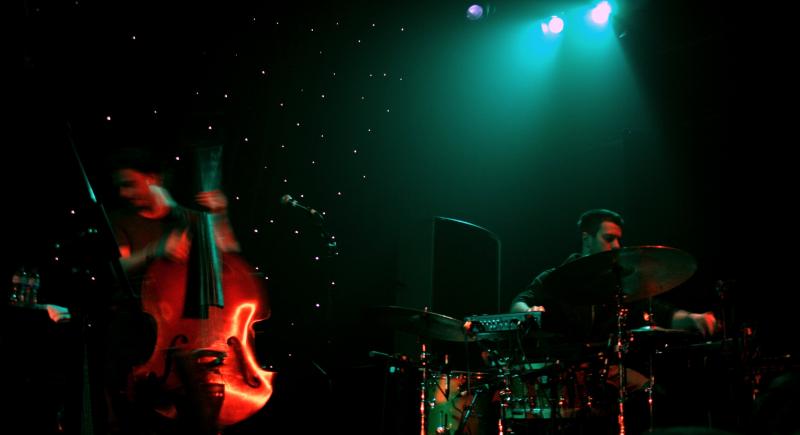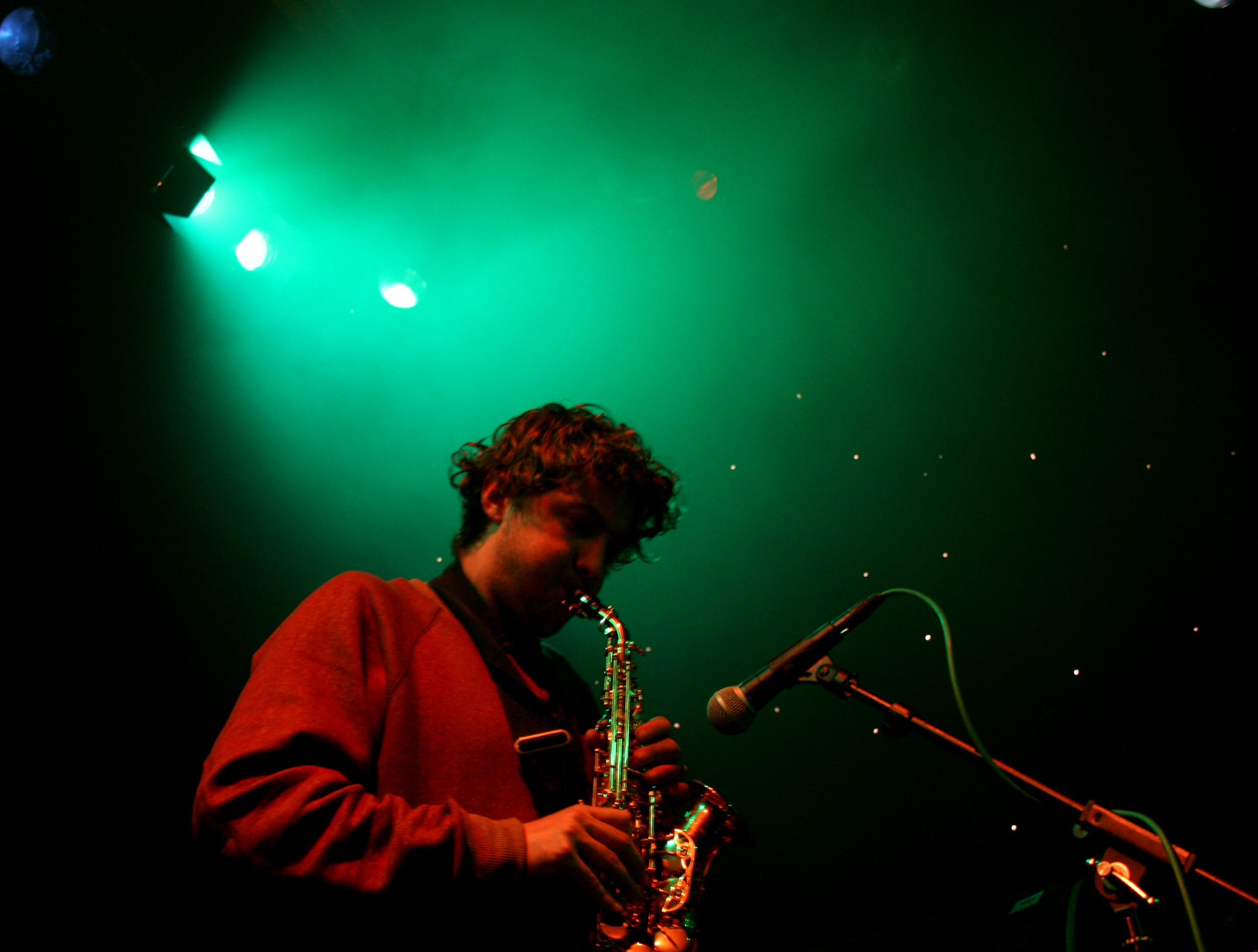Portico Quartet, The Komedia, Brighton | reviews, news & interviews
Portico Quartet, The Komedia, Brighton
Portico Quartet, The Komedia, Brighton
London foursome sucessfully meld jazz to some intense electronic sounds

I do not envy the Portico Quartet’s stage manager. The Komedia stage is not very big and most of it is covered in wire, effects boxes, electronic gizmos and other units. Amidst this carnage of cables, before the band arrives on stage, stands laptop DJ, Flying White Dots (aka Bryan Whellams), DJ Rob Da Bank’s “favourite bootleg mashup artist” (so Whellams' business card later tells me).
 Portico Quartet are an unassuming-looking bunch. They arrive on stage and ensconce themselves at their stations. Only saxophonist Jack Wylie (pictured left) appears to have any freedom of movement - his bandmates are as surrounded by banks of technology as starship fighters in a low-budget Star Wars rip-off. Sadly they don’t look like starfighters; they look like geography students on dress-down Wednesday. Which is a shame because, with a performance so studied yet entertaining, they could do with a bit of visual pizzazz as counterpoint, something to say, as the music often does, that, hey, as well as being complex and sonically intriguing this is fun. They do, however, have flavoursome mood lighting and a black backdrop pinpricked with white lights, like a cabaret night sky.
Portico Quartet are an unassuming-looking bunch. They arrive on stage and ensconce themselves at their stations. Only saxophonist Jack Wylie (pictured left) appears to have any freedom of movement - his bandmates are as surrounded by banks of technology as starship fighters in a low-budget Star Wars rip-off. Sadly they don’t look like starfighters; they look like geography students on dress-down Wednesday. Which is a shame because, with a performance so studied yet entertaining, they could do with a bit of visual pizzazz as counterpoint, something to say, as the music often does, that, hey, as well as being complex and sonically intriguing this is fun. They do, however, have flavoursome mood lighting and a black backdrop pinpricked with white lights, like a cabaret night sky.
Portico Quartet, a London band, first appeared on the radar due to a Mercury Music Prize nomination for their 2007 debut album Knee-Deep in the North Sea. They have since established themselves as the jazz band who can whip up a festival crowd, who can veer in tone, if not directly in content, well into electronica and rock territory. Their eponymous recent album, their third, is their most interesting and fulfilling, to my ears, as it further embraces their electronic leanings.
It’s from this they draw most of tonight’s set. Drummer Duncan Bellamy appears to lead the fray, spending as much time jacking synths into action as playing the drums while Wylie, swapping between soprano and tenor sax, and Milo Fitzpatrick, on electronic double bass, replete with attached quiver of bows, both add subtle melody and texture. The other reason Portico Quartet are sometimes known outside their immediate circle of fans is their use of the hang, a flying saucer-shaped, recently invented percussive instrument. But again, hang-player Keir Vine spends as much time at his electronic boxes as his hangs.
The set starts off in cool, ambient soundtrack territory but soon gains pace. Tunes such as “Window Seat” and “Spinner” lay out the stall but then “4096 Colours”, with its drum & bass percussion, hits home like a noise-storm by comparison. From there the band is all out, creating a music that is both precise but impressively energetic, never kowtowing to dance music’s predictable 4/4 but instead rhythmically weaving patterns and causing the crowd to wriggle and whoop in approval. As the set progresses the sound I’m hearing is reminiscent not so much of jazz as Detroit techno artists such as Terrence Parker who spent the Nineties investigating a more soulful, melodic path for their city’s famed music style. Portico dispatch most of the new album with focus and serious-faced concentration. They drop in only a couple from previous albums, but no one minds.
This is where I have a confession. Music journalists should never leave a gig before the end. I have done so extremely rarely. We’re all haunted by the stories such as the occasion copy was filed midway through one of Whitney Houston’s final UK gigs, praising her wonderful singing, but the writer in question had left before the notorious broken version of “I Will Always Love You” that made the next day’s front pages. No, it’s better to be safe than sorry but, on this occasion, as the band returned for their encore I was called unavoidably away, and presumed I was safe in the assumption that Portico Quartet would continue in the same vein and not bring on Robert Plant for a jam.
The next morning I rang their PR. Plant did not appear but I had missed the small scoop of Cornelia Dahlgren arriving onstage to sing the only vocal tune of the night, “Steepless”, before the foursome closed with “Dawn Patrol” from the second album Isla. I may have missed this – for shame – but what I did catch was a band whose technical aptitude was matched by an ability to woo a crowd with music that’s complex, sinuous and subtle.
Watch the video for "Ruins" by Portico Quartet
rating
Explore topics
Share this article
The future of Arts Journalism
You can stop theartsdesk.com closing!
We urgently need financing to survive. Our fundraising drive has thus far raised £49,000 but we need to reach £100,000 or we will be forced to close. Please contribute here: https://gofund.me/c3f6033d
And if you can forward this information to anyone who might assist, we’d be grateful.

Subscribe to theartsdesk.com
Thank you for continuing to read our work on theartsdesk.com. For unlimited access to every article in its entirety, including our archive of more than 15,000 pieces, we're asking for £5 per month or £40 per year. We feel it's a very good deal, and hope you do too.
To take a subscription now simply click here.
And if you're looking for that extra gift for a friend or family member, why not treat them to a theartsdesk.com gift subscription?
more New music
 Waylon Jenning’s 'Songbird' raises this country great from the grave
The first of a trove of posthumous recordings from the 1970s and early 1980s
Waylon Jenning’s 'Songbird' raises this country great from the grave
The first of a trove of posthumous recordings from the 1970s and early 1980s
 Lady Gaga, The Mayhem Ball, O2 review - epic, eye-boggling and full of spirit
One of the year's most anticipated tours lives up to the hype
Lady Gaga, The Mayhem Ball, O2 review - epic, eye-boggling and full of spirit
One of the year's most anticipated tours lives up to the hype
 Slovenian avant-folk outfit Širom’s 'In the Wind of Night, Hard-Fallen Incantations Whisper' opens the door to inner space
Unconventional folk-based music which sounds like nothing else
Slovenian avant-folk outfit Širom’s 'In the Wind of Night, Hard-Fallen Incantations Whisper' opens the door to inner space
Unconventional folk-based music which sounds like nothing else
 'The Art of Loving': Olivia Dean's vulnerable and intimate second album
Neo soul Londoner's new release outgrows her debut
'The Art of Loving': Olivia Dean's vulnerable and intimate second album
Neo soul Londoner's new release outgrows her debut
 Music Reissues Weekly: The Peanut Butter Conspiracy - The Most Up Till Now
Definitive box-set celebration of the Sixties California hippie-pop band
Music Reissues Weekly: The Peanut Butter Conspiracy - The Most Up Till Now
Definitive box-set celebration of the Sixties California hippie-pop band
 Doja Cat's 'Vie' starts well but soon tails off
While it contains a few goodies, much of the US star's latest album lacks oomph
Doja Cat's 'Vie' starts well but soon tails off
While it contains a few goodies, much of the US star's latest album lacks oomph
 Mariah Carey is still 'Here for It All' after an eight-year break
Schmaltz aplenty but also stunning musicianship from the enduring diva
Mariah Carey is still 'Here for It All' after an eight-year break
Schmaltz aplenty but also stunning musicianship from the enduring diva
 Album: Solar Eyes - Live Freaky! Die Freaky!
Psychedelic indie dance music with a twinkle in its eye
Album: Solar Eyes - Live Freaky! Die Freaky!
Psychedelic indie dance music with a twinkle in its eye
 Album: Night Tapes - portals//polarities
Estonian-voiced, London-based electro-popsters' debut album marks them as one to watch for
Album: Night Tapes - portals//polarities
Estonian-voiced, London-based electro-popsters' debut album marks them as one to watch for
 Album: Mulatu Astatke - Mulatu Plays Mulatu
An album full of life, coinciding with a 'farewell tour'
Album: Mulatu Astatke - Mulatu Plays Mulatu
An album full of life, coinciding with a 'farewell tour'
 Music Reissues Weekly: Sly and the Family Stone - The First Family: Live At Winchester Cathedral 1967
Must-have, first-ever release of the earliest document of the legendary soul outfit
Music Reissues Weekly: Sly and the Family Stone - The First Family: Live At Winchester Cathedral 1967
Must-have, first-ever release of the earliest document of the legendary soul outfit

Add comment